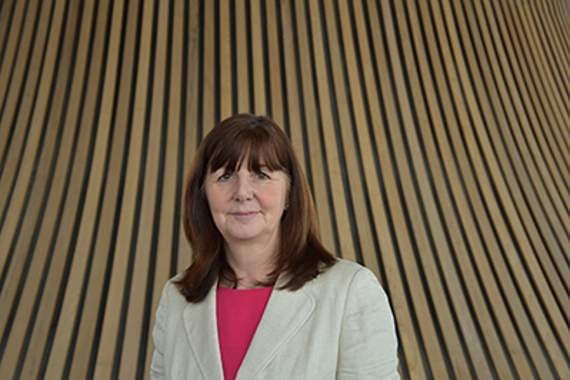THE Welsh Government needs to work with Welsh farmers to address bovine TB disease in cattle as well as wildlife, says NFU Cymru.
The call comes after rural affairs minister Lesley Griffiths updated the National Assembly on Welsh Government’s bovine TB eradication programme, which was launched 18 months ago. In her statement Ms Griffiths said there were 746 new TB herd incidents in Wales, representing a 5% decrease compared to 2017. Of these incidents, 11,233 animals were slaughtered as a result of TB, representing a 12% increase. This increase, she said, was largely due to heightened surveillance and the identification and removal of a higher number of infected animals.
Ms Griffiths said: “Today I am pleased to be able to provide an update on the programme now we have a complete 2018 dataset of TB statistics available. We are making progress in tackling the disease but we must now keep up the momentum to stamp out the disease. Our regional approach is clearly working and has enabled us to adapt the way we tackle the disease and tailor our response depending on the risk in that area.
“However, we cannot eradicate the disease alone – we all have a role to play. I cannot over-emphasise the value of collaboration when it comes to TB eradication. By working together, with a single purpose, we will stamp out this disease.”
But NFU Cymru described the disparity between new herd incidents and slaughtered animals as “worrying” and said it was concerned to see the Welsh Government proposing a review of the TB compensation regime.
NFU Cymru deputy president Aled Jones, who went to Cardiff on Tuesday, April 31 to hear the minister deliver her statement, said: “It is 18 months since the minister launched the refreshed Bovine TB eradication programme and Welsh farmers will be questioning whether we will ever be rid of this disease. To see 11,233 cattle slaughtered in 2018 – a 12% increase from the previous year – is completely unacceptable and in our view is not an indicator that this strategy is having a sufficient impact on this serious problem.
“While Welsh Government can point towards relative success in the Low TB Area in North West Wales, which is of course welcomed, this is of no consolation whatsoever to those based in the hotspots, both in High and some Intermediate areas, where bovine TB continues to cause untold stress and concern. We cannot forget that the facts and figures on spreadsheets and data dashboards do not truly reflect the level of suffering being experienced by farming families in many parts of Wales.
“The minister’s statement alludes to the fact that we all need to work together to eradicate TB in Wales and while NFU Cymru agrees with this statement, the reality is that the approach to tackling bovine TB in Wales is not a ‘true’ partnership approach. Farmers are the ones bearing the financial costs through additional cattle controls and restrictions while the reservoir of disease in wildlife remains relatively untouched. The refreshed approach was supposed to address this issue but sadly it does not.
“We need only look over the border to England to see how an effective collaborative approach can be put in place to successfully tackle bovine TB. Defra has worked closely with the industry as part of the strategy in England, giving the NFU and farmers the confidence to prepare and submit licence applications. Preliminary figures suggest this is leading to a reduction of the disease in a number of those cull areas. We again urge the Minister to look at the effectiveness of the model adopted in England.
“The minister’s statement today also makes reference to the ‘unsustainable’ levels of TB compensation paid to Welsh farmers and its cost to the public purse. Seeing this compensation branded as ‘unsustainable’ is particularly galling for farmers in Wales, when it is the Welsh Government’s failure to implement a holistic policy that effectively eradicates the disease in the first place that is making such compensation necessary. The best way to lower that £14m spend would be to introduce measures that tackle the disease across all vectors. The imposition of the severe interpretation skin tests and blood tests, while perhaps understandable from the disease control point of view, is devastating to many businesses who see their production base being taken from them and the consequential losses which are not compensated are massive to these businesses.
“If we are ever to live and farm in a country that is free of bovine TB we need to remove the politics and emotion from this debate and instead focus on the science – just as our neighbours have done in England and other parts of the world. NFU Cymru remains committed to working with Welsh Government in a true partnership approach that can see us work together to effectively tackle the disease in cattle, but also in the wildlife population as well.”
Wales’ other major farming union, FUW, said the 5 per cent reduction in new TB herd incidents “must be viewed in light of the significant 12 per cent increase in the number of cattle slaughtered”. Its statement said: “The sheer volume of TB testing undertaken in Wales only continues to decimate farm businesses and the FUW believes the repeated and predictable assertion by Welsh Government that such numbers reflect increased surveillance is no longer acceptable.
“We are particularly frustrated by the reference to an ‘unsustainable’ compensation budget. The compensation paid out to cattle keepers is a direct reflection of the number of cattle compulsorily slaughtered due to this disease and the high compensation budget therefore represents a continuing lack of progress.
“In many instances, infection with bovine TB is due to circumstances out of the farmer’s control, and we would point out that, at present, farmers are compensated only for the direct market value of the animal slaughtered. No compensation is offered for the additional costs incurred such as lost revenue, loss of milk production, loss of breeding lines, delays to re-stocking and movement restrictions.
“Reducing the disease in both cattle and wildlife would reduce the compensation budget but the politics surrounding this disease have allowed a significant source of infection to remain almost entirely unchecked. Without such measures, the industry remains vulnerable to ever-increasing levels of disease and a change in policy direction is well overdue.
“The FUW remains committed to working with Welsh Government on tackling bovine TB but is resolute in believing that real partnership working cannot be achieved without an equitable focus on both cattle and wildlife sources of infection.




